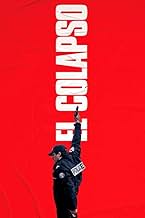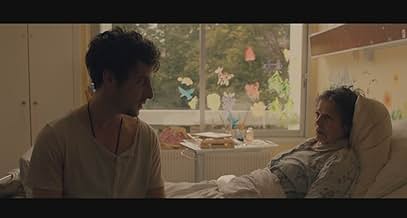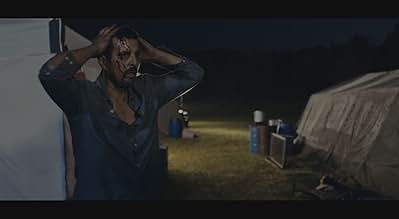ÉVALUATION IMDb
7,8/10
3 k
MA NOTE
Qu'arriverait-il à notre société si le système s''effondrait demain?Qu'arriverait-il à notre société si le système s''effondrait demain?Qu'arriverait-il à notre société si le système s''effondrait demain?
- Prix
- 2 nominations au total
Parcourir les épisodes
Avis en vedette
The highlight of this mini series is its realization. Each chapter is shot with a handheld camera and in a single continuous take without editing, which makes it a novel product and very difficult to film. Another feature of the series is that the last episode could be considered the first, since the final chapter tells the origin of how the collapse of the world began. Each episode is independent of the other and tells stories of ordinary people in an environment in which the planet has collapsed and there is a lack of food, energy services are scarce or failing and people try by all means to find a way to survive, as they As the episodes go by, there is a progressive count of the days that have passed since this collapse, so as the stories progress they are increasingly crude and violent. We can see how people are desperate to get food that is missing in a market, fuel to escape to a safer place or simply people with a lot of money who have hired special services that will take them to special bunkers so that they are safe. A very entertaining, innovative series, very well directed and acted, and with a message that will leave more than one viewer thinking about the real possibility that the day of the collapse can come true.
Ranging from episodes of fifteen minutes to twenty seven minutes this eight-parter told tales of disparate people and groups tenuously linked in some of the episodes.
The end was no longer nigh, it had happened. Capitalist society had broken down and the programmes explored various characters' reactions to survive the cataclysm.
Few of the episodes engaged me. However both the storyline and the acting in the episode set in the old folks home were a definite winner. I found the final episode the weakest of all as I could not believe either in the subversives nor in their acceptance by the television debate programme.
I also found the garage episode far fetched. A baseball bat would never have kept the ravening hordes away nor could it have stopped them sacking the place.
All in all an easy watch to fill in some time.
The end was no longer nigh, it had happened. Capitalist society had broken down and the programmes explored various characters' reactions to survive the cataclysm.
Few of the episodes engaged me. However both the storyline and the acting in the episode set in the old folks home were a definite winner. I found the final episode the weakest of all as I could not believe either in the subversives nor in their acceptance by the television debate programme.
I also found the garage episode far fetched. A baseball bat would never have kept the ravening hordes away nor could it have stopped them sacking the place.
All in all an easy watch to fill in some time.
Abstract
Eight exciting chapters, eight moments and extreme situations derived from a sudden? crisis that leaves the planet without supplies.
Review
Starting on J-Day, there is a sudden global collapse whereby the supply of food, energy and other inputs is cut off.
This French miniseries addresses in each chapter distressing situations that arise from that event whose nature we ignore.
But it does not do it in any way: each one of its nervous chapters lasts only around 20 minutes and is filmed in real time with a handheld camera and in a single sequence shot. And it is not a quirk of style: the dramatic effect is prodigious and the technical expertise in the realization in some is astonishing.
The series does not fall into the usual Manichean nihilism of apocalyptic dystopias because, although human miseries appear in each chapter, the result of desperation for survival, gestures of solidarity and collaboration are not absent either.
The situations dealt with are individual or collective, often dilemmatic, with very different locations, different characters (with very few exceptions and few links between them) and with strong social and class notes, but without falling into the cliché. Overall the pacing is distressing but never hysterical, and the filmmakers have a knack for making chapters quite different and with room for surprise.
Filmed in 2019, this dystopia directed by Jérémy Bernard, Guillaume Desjardins and Bastien Ughetto (who stars in one of the most terrifying episodes) is prescient in some aspects of the global coronavirus crisis and undoubtedly related to the prevailing capitalist modes of production.
Pay attention to the final titles of each chapter. If you pay attention, you will see that they are revealing.
Eight exciting chapters, eight moments and extreme situations derived from a sudden? crisis that leaves the planet without supplies.
Review
Starting on J-Day, there is a sudden global collapse whereby the supply of food, energy and other inputs is cut off.
This French miniseries addresses in each chapter distressing situations that arise from that event whose nature we ignore.
But it does not do it in any way: each one of its nervous chapters lasts only around 20 minutes and is filmed in real time with a handheld camera and in a single sequence shot. And it is not a quirk of style: the dramatic effect is prodigious and the technical expertise in the realization in some is astonishing.
The series does not fall into the usual Manichean nihilism of apocalyptic dystopias because, although human miseries appear in each chapter, the result of desperation for survival, gestures of solidarity and collaboration are not absent either.
The situations dealt with are individual or collective, often dilemmatic, with very different locations, different characters (with very few exceptions and few links between them) and with strong social and class notes, but without falling into the cliché. Overall the pacing is distressing but never hysterical, and the filmmakers have a knack for making chapters quite different and with room for surprise.
Filmed in 2019, this dystopia directed by Jérémy Bernard, Guillaume Desjardins and Bastien Ughetto (who stars in one of the most terrifying episodes) is prescient in some aspects of the global coronavirus crisis and undoubtedly related to the prevailing capitalist modes of production.
Pay attention to the final titles of each chapter. If you pay attention, you will see that they are revealing.
From the first episode, the show captures the desperation of average people living in the hyper capitalistic world. People just want to continue to live their normal lives, but our normal lives have created a feedback cycle that will end in our self-destruction. There is no escape, and the unsettling feeling in the first episode carries through later heart wrenching stories of survival, desperation, and interspersed pockets of hope.
Highly recommend this show to anyone who has this feeling that modern society cannot continue down as we know it and to see what happens if we do. Just be prepared to be a bit uncomfortable, because the show feels real, and makes you question if you are doing enough to help prevent this type of situation from coming to fruition.
I loved the single take approach, it keeps the show personal further reinforces the hyper realism of the show. The single takes also feel more impactful as each episode reaches its conclusion.
Give it a try, if you can't find a place to stream it, google the name of the show in the subreddit collapse on reddit. That's where I found the subtitled episodes.
Highly recommend this show to anyone who has this feeling that modern society cannot continue down as we know it and to see what happens if we do. Just be prepared to be a bit uncomfortable, because the show feels real, and makes you question if you are doing enough to help prevent this type of situation from coming to fruition.
I loved the single take approach, it keeps the show personal further reinforces the hyper realism of the show. The single takes also feel more impactful as each episode reaches its conclusion.
Give it a try, if you can't find a place to stream it, google the name of the show in the subreddit collapse on reddit. That's where I found the subtitled episodes.
This excellently made short series is atmospherically dense like Black Mirror.
But it's not about the consequences of technological development.
At least not directly. But about the collapse of the social order, the survival of people while everything around them no longer exists.
Each individual episode represents a certain period of time, e.g. episode 7, which shows a woman surviving 50 days after the collapse of society (one of the best episodes, by the way). The exception is the last episode 8, which shows the events 5 days before the collapse.
A much too unknown series that left a deep impression on me. Unfortunately the series only consists of 8 episodes, each about 15-25 minutes short. The short duration of the episodes is an advantage when designing a captivating episode. I hope there will be a new season with more episodes at some point. With episodes this short, there should be at least 15 episodes.
In terms of production (camera, editing, lighting, sound / music), the consequences are all equal and well done. This is an example of what the European film industry can offer.
Presumably some self-proclaimed ''patriots'' (Neoliberals with great love for the rich) who are delusional will see this series as socialist propaganda.
Each individual episode represents a certain period of time, e.g. episode 7, which shows a woman surviving 50 days after the collapse of society (one of the best episodes, by the way). The exception is the last episode 8, which shows the events 5 days before the collapse.
A much too unknown series that left a deep impression on me. Unfortunately the series only consists of 8 episodes, each about 15-25 minutes short. The short duration of the episodes is an advantage when designing a captivating episode. I hope there will be a new season with more episodes at some point. With episodes this short, there should be at least 15 episodes.
In terms of production (camera, editing, lighting, sound / music), the consequences are all equal and well done. This is an example of what the European film industry can offer.
Presumably some self-proclaimed ''patriots'' (Neoliberals with great love for the rich) who are delusional will see this series as socialist propaganda.
Meilleurs choix
Connectez-vous pour évaluer et surveiller les recommandations personnalisées
- How many seasons does The Collapse have?Propulsé par Alexa
Détails
- Date de sortie
- Pays d’origine
- Site officiel
- Langue
- Aussi connu sous le nom de
- The Collapse
- Consultez plus de crédits d'entreprise sur IMDbPro
Contribuer à cette page
Suggérer une modification ou ajouter du contenu manquant

Lacune principale
By what name was L'effrondrement (2019) officially released in Japan in Japanese?
Répondre
![Regarder Bande-annonce [OV]](https://m.media-amazon.com/images/M/MV5BNWY2M2EzYTYtYWVlZS00OTc0LTg4MTQtMGJjZmQzMzA1N2I3XkEyXkFqcGdeQXRyYW5zY29kZS13b3JrZmxvdw@@._V1_QL75_UY281_CR81)




























